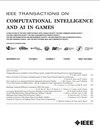改变游戏代理的可用资源:代理实验中的另一个相关设计因素
Q2 Computer Science
IEEE Transactions on Computational Intelligence and AI in Games
Pub Date : 2017-12-01
DOI:10.1109/TCIAIG.2016.2565558
引用次数: 7
摘要
迭代囚犯困境是一种同时存在的两人博弈,在合作与冲突研究中得到了广泛的应用。最近的研究表明,许多因素以与对照研究不一致的方式改变进化剂的行为。这项研究扩展了对改变游戏代理可用的计算或信息资源水平对其集成行为的影响的初步探索。这两类信息都会对代理行为产生影响。研究了四种表示:查找表、马尔可夫链、有限状态机和前馈神经网络。一种称为游戏概况的评估工具被用来证明,在一个代表性类型中,对于不同的资源水平,合作性和合作性随进化时间的变化都是显著不同的。当资源级别不同时,查找表和神经网络的变化最小,而马尔可夫链的变化最大。随着进化的进行,可用的内部资源也会改变代理人的竞争能力以及他们变得合作的速度。本文章由计算机程序翻译,如有差异,请以英文原文为准。
Changing Resources Available to Game Playing Agents: Another Relevant Design Factor in Agent Experiments
The iterated prisoner's dilemma is a simultaneous two-player game widely used in studies on cooperation and conflict. Recent research has demonstrated that a number of factors change the behavior of evolved agents in a manner not consistent with controlled studies. This study extends a preliminary exploration of the impact of changing the level of computational or informational resources available to game playing agents on their ensemble behavior. Both these categories of information are shown to have an impact on agent behavior. Four representations are studied: lookup tables, Markov chains, finite-state machines, and feed-forward neural nets. An assessment tool called the play profile is used to demonstrate that both the cooperativeness and the change in cooperativeness over evolutionary time are substantially different for different resource levels within a representational type. Lookup tables and neural nets are found to change the least when the resource levels they are presented with are varied, while Markov chains vary the most. Available internal resources are also found to change the competitive ability of agents as well as the rate at which they become cooperative as evolution proceeds.
求助全文
通过发布文献求助,成功后即可免费获取论文全文。
去求助
来源期刊

IEEE Transactions on Computational Intelligence and AI in Games
COMPUTER SCIENCE, ARTIFICIAL INTELLIGENCE-COMPUTER SCIENCE, SOFTWARE ENGINEERING
CiteScore
4.60
自引率
0.00%
发文量
0
审稿时长
>12 weeks
期刊介绍:
Cessation. The IEEE Transactions on Computational Intelligence and AI in Games (T-CIAIG) publishes archival journal quality original papers in computational intelligence and related areas in artificial intelligence applied to games, including but not limited to videogames, mathematical games, human–computer interactions in games, and games involving physical objects. Emphasis is placed on the use of these methods to improve performance in and understanding of the dynamics of games, as well as gaining insight into the properties of the methods as applied to games. It also includes using games as a platform for building intelligent embedded agents for the real world. Papers connecting games to all areas of computational intelligence and traditional AI are considered.
 求助内容:
求助内容: 应助结果提醒方式:
应助结果提醒方式:


